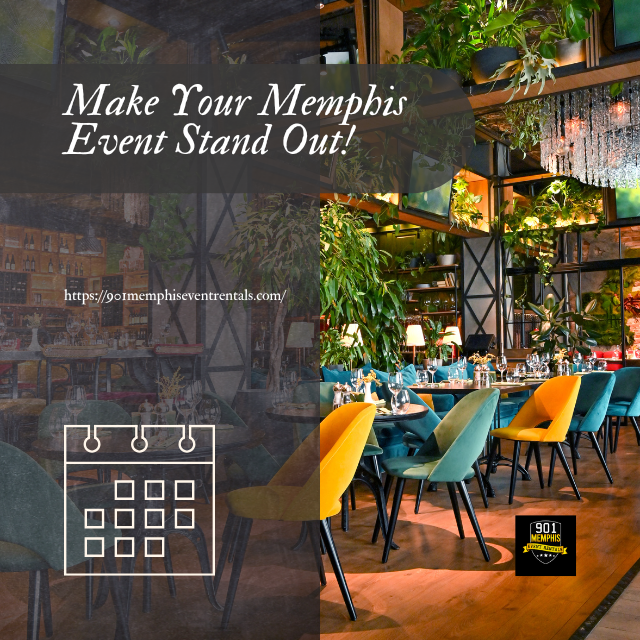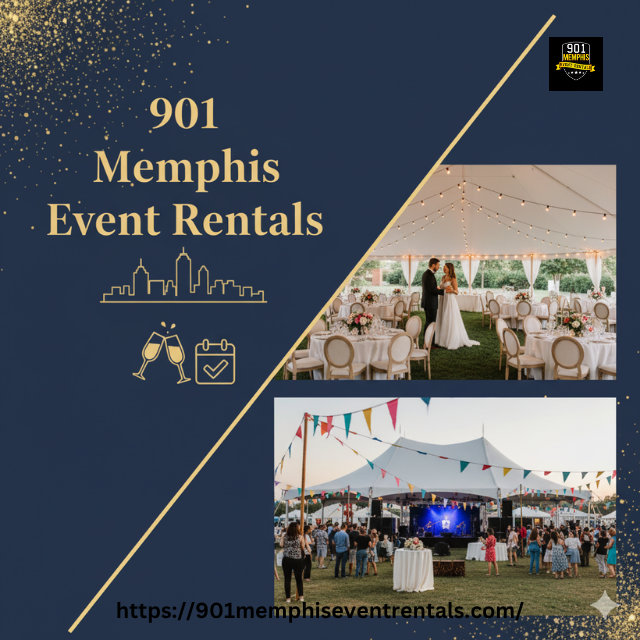Planning an event in Memphis can be a rewarding experience with the right approach and resources. From the charm of Beale Street to the historical significance of Graceland, Memphis offers a unique backdrop for any occasion. Knowing how to effectively plan and utilize rental services can make the difference between a good event and a great one.
Start by considering your event type, venue, and expected guest count to lay a solid foundation for a memorable experience. Whether you’re organizing a wedding, corporate gathering, or a casual get-together, outlining these details early will guide your decisions throughout the planning process.
Rental services provide essential support, offering everything from seating and lighting to audio-visual equipment. By leveraging local rental companies, you ensure that your event not only runs smoothly but also embodies the vibrant spirit of Memphis.
Defining Your Memphis Event Vision
Crafting a clear event vision is crucial to pulling off a successful event. Key components include establishing objectives, determining the audience, and selecting an optimal date and time.
Setting Clear Objectives
Clear objectives provide the foundation for your event. Consider what you want to achieve—whether it’s increasing awareness of a cause, launching a new product, or simply hosting a memorable gathering. Make goals specific and measurable to track progress effectively. Frequently, this involves defining success indicators such as attendance numbers, engagement rates, or revenue targets. A well-defined objective aligns efforts and resources, ensuring that the event team works towards the same goals.
Identifying Target Audience
Understanding your audience is essential for planning. Analyze who you intend to attract and tailor the event’s features to meet their preferences and interests. Factors like demographics, interests, and cultural elements can influence your planning choices. Crafting a profile of your typical attendee can guide decisions about location, theme, activities, and promotional strategies. Knowing the audience allows for more targeted marketing efforts, improving attendee satisfaction and engagement.
Choosing the Right Date and Time
Timing can greatly influence the success of your event. In Memphis, consider local events, holidays, or weather patterns that might affect attendance. Research potential conflicts or opportunities in the community calendar to avoid overlaps. Flexibility is often essential—being open to weekday or weekend slots can mitigate scheduling issues. Additionally, consider the typical daily routine of your target audience. Scheduling when your audience is most available increases participation and engagement.
By meticulously planning objectives, understanding attendees, and picking the right date and time, your Memphis event will be set on the path to success.
Establishing an Event Budget
Creating a clear and detailed budget is crucial for the success of any event. This involves estimating rental costs, deciding how to allocate funds to different areas, and keeping a close watch on spending.
Estimating Rental Costs
Use past events as references to estimate rental costs. Begin by listing what you’ll need: venue, furniture, audio-visual equipment, and catering supplies. Contact multiple vendors for quotes to compare prices.
A simple table can help:
| Item | Estimated Cost |
|---|---|
| Venue | $ |
| Furniture | $ |
| Audio-Visual | $ |
| Catering Supplies | $ |
This detailed list helps avoid unexpected expenses.
Allocating Funds to Key Areas
Prioritize spending by determining which areas are most important. Typically, the venue and catering take a significant portion of the budget. Marketing, decor, and entertainment also require careful consideration.
Allocate a percentage of your budget to each category. For example, 30% for venue, 25% for catering, 15% for marketing, and so on. Using a pie chart can visually display these allocations.
Consider how each area contributes to the event’s success and adjust allocations accordingly.
Tracking Expenses Efficiently
Use a spreadsheet or budgeting software for tracking expenses. Input all receipts and invoices promptly to keep financial data current. This practice avoids any surprises and keeps you within budget.
Create a simple list to review:
- Record purchase dates
- Include amounts spent
- Note categories under each expense
Regularly review this data. Make adjustments as necessary to accommodate unforeseen costs. With effective tracking, maintaining financial control becomes manageable.
Selecting the Ideal Memphis Venue
Choosing the right venue is crucial for the success of your event. In Memphis, factors such as location, amenities, and logistics play significant roles in venue selection. Here are some detailed considerations to guide you.
Venue Research and Comparison
Begin by mapping out a list of potential venues in Memphis that align with your event type and size. Use online resources and reviews to learn about each venue’s offerings. Create a comparison chart with key details:
| Venue Name | Capacity | Location | Cost | Amenities |
|---|---|---|---|---|
| Example Venue 1 | 200 | Downtown | $$ | WiFi, AV equipment |
| Example Venue 2 | 500 | Midtown | $$$ | Parking, Catering |
Visit each venue for a firsthand look. Pay attention to ambiance, cleanliness, and layout flexibility. Ensure they have the necessary infrastructure for any planned activities. Contact previous clients for feedback if possible. Staying organized and systematic in your approach will streamline the process.
Booking Considerations
When booking, check for open dates that fall within your preferred timeframe. Be clear about all the costs involved, including deposit requirements, cancellation policies, and any hidden fees. Make sure you understand what’s included with the rental, such as tables, chairs, and technology services.
Clarify the terms of modifying your contract to accommodate unexpected changes. Confirm whether the venue provides in-house services or if you need to hire external vendors. Discuss any restrictions that may affect your event, like noise ordinances or time limitations.
Accessibility and Parking
Ensure the venue is accessible to all attendees, including those with disabilities. Check for ramps, elevators, and other necessary accommodations. Parking availability is also critical. Verify the number of spots, whether they are complimentary or require a fee, and if valet services are available.
Proximity to public transportation and major roads can significantly improve attendee convenience. If parking is limited, consider arranging for additional transportation such as shuttle services. Your attendees’ comfort and ease of access should be top priorities when selecting a venue.
Securing Essential Event Rentals
Planning an event requires careful selection of rentals. Ensure you have the right tables, chairs, linens, tents, outdoor coverings, and audio-visual equipment to provide your guests with comfort and an enjoyable experience.
Tables, Chairs, and Linens
Choosing the right tables and chairs is crucial. Consider the event style and guest count. Round tables often work well for dinner service, offering a communal feeling, while rectangular tables are efficient for buffet setups.
Chairs should complement your tables. Comfort is key, so test options if possible. Chiavari chairs are popular for elegant events. For linens, pick colors that align with your theme. High-quality materials enhance the atmosphere. Avoid mismatched designs that may distract from the event’s aesthetic.
Tents and Outdoor Coverings
When hosting outdoors, tents provide shelter and define space. Consider size and type. Pole tents create an elegant look with sweeping peaks, while frame tents offer flexibility since they don’t require center poles.
Weather conditions also influence your choice. Ensure the tent materials are waterproof and investigate sidewall options for additional protection. Clear-top tents can add a sense of openness while protecting guests. Always verify rental companies’ installation and breakdown services for efficiency and peace of mind.
Audio-Visual Equipment
Quality audio-visual equipment amplifies the guest experience. Identify the event’s demands: some gatherings need only basic speakers and microphones, while others require elaborate systems with multiple screens and projectors.
Take room size into account when choosing audio systems. Large spaces might require distributed speaker systems to cover the area evenly. For visuals, high-lumen projectors ensure clarity. Test all equipment before the event to prevent technical issues. Keep spare parts or backups ready for emergencies to minimize disruption.
Enhancing Your Event With Specialty Rentals
Specialty rentals offer unique options for events, allowing you to add creativity and functionality. These elements can set the tone and make your Memphis event stand out by using themed decor, tailored lighting, and high-quality catering equipment.
Decor and Thematic Props
Decor and thematic props are essential for creating the desired atmosphere. From elegant table settings to unique centerpieces, rentals can align with your theme, whether it’s vintage, modern, or something unconventional.
Consider options like custom backdrops, artistic sculptures, or themed furniture. Selecting the right props helps convey the event message.
Using seasonal decorations can further enhance your event. For instance, incorporating earthy tones and natural elements during a fall event brings warmth and coziness. Explore local rental services that offer various packages to match your specific needs.
Lighting Solutions
Lighting plays a critical role in setting the mood. Whether hosting an intimate gathering or a grand celebration, specialty lighting can dramatically transform a venue’s appearance.
LED uplights, rope lights, and chandeliers are popular choices. These options can highlight architectural features or create a soft ambiance. Colored lighting effects can emphasize the event’s theme and stage presence.
Spotlights and gobos can be used to draw attention to key areas or special performances. Consider consulting with lighting professionals to ensure that your ambition and the venue are in synergy.
Catering Equipment
State-of-the-art catering equipment ensures that food presentation and service run smoothly. Choose from an array of rental options like chafing dishes, portable bars, and elegant glassware.
Whether you’re planning a formal dinner or a casual buffet, having the right equipment is crucial. Specialized serving pieces can add a touch of class to the dining experience.
Ensure that your catering needs align with the anticipated guest count. Collaborate with your caterer to understand what equipment is essential for your menu, and don’t hesitate to make use of rentals for items like hot boxes and catering stations.
Coordinating Rental Logistics
Coordinating logistics for event rentals in Memphis involves organizing delivery times, managing on-site processes, and handling returns efficiently. Clear communication and detailed planning are essential for each phase to ensure a smooth experience.
Delivery and Setup Schedules
Establishing a clear delivery and setup schedule is crucial. Determine the time when the venue will be accessible to receive rental items. Work closely with your rental vendor to ensure that every item arrives on time and in proper condition.
Engage in clear communication with the rental company. Confirm delivery times and ensure instructions are well-documented. Prepare a list of all items expected for delivery, verifying the quantity and quality upon arrival. Address any discrepancies immediately with the provider.
Coordinate with venue staff to assist in overseeing the setup if necessary. Consider potential obstacles such as traffic, parking restrictions, or limited loading zones and plan accordingly. This will help prevent delays and ensure a timely setup.
On-Site Coordination
Assign a reliable point of contact to manage the rental logistics on-site. This person should oversee the delivery, setup, and on-the-day troubleshooting. Ensure they have a comprehensive understanding of the event layout and rental needs.
Create a detailed layout map highlighting where each rental item should be placed. This helps streamline the setup process and ensures accuracy. Provide this map to both your point of contact and the rental staff to minimize errors.
Communicate regularly with the on-site coordinator and establish a check-in system. This is to swiftly address any issues that may arise and ensure that all items are properly integrated into the event setup.
Returns and Cleanup
Organize the schedule for dismantling and returning all rental items. Confirm with your rental provider the exact pickup times and procedures for returns. Clear communication here will prevent any late fees or additional charges.
Ensure that the breakdown crew knows which items belong to the rental company. Having a list or labeled items will streamline the process. Coordinate with cleaning staff so that the venue can be returned to its original condition without delay.
Conduct a post-event inspection with your rental provider to confirm that all items are accounted for. Address any damaged or missing pieces immediately to avoid additional costs. Maintain records of this process to streamline future rental logistics.
Working With Memphis Rental Vendors
When planning an event in Memphis, collaborating with local rental vendors is crucial. Begin by identifying reputable suppliers, negotiate fair agreements, and ensure necessary permits and insurance are in place.
Researching Trusted Suppliers
Finding trustworthy rental vendors in Memphis means sifting through reviews and seeking recommendations. Personal recommendations from local event planners or venues are invaluable. Check online testimonials and review sites such as Yelp or Google Reviews.
Visit suppliers in person when possible. This provides a firsthand look at the quality of their offerings. Memphis has a diverse vendor market, so make a list of essentials like tents, chairs, tables, and audio equipment. Prioritize vendors who offer timely delivery and setup services.
Ensuring a successful partnership involves verifying that the vendor holds necessary licenses and certifications. This due diligence minimizes risks associated with equipment reliability and service quality.
Negotiating Rental Agreements
Begin negotiations by understanding your budget and core needs. Clearly communicate these to vendors. Request a breakdown of costs and identify any potential hidden fees. Be mindful of delivery, setup, and teardown costs, as they can significantly influence the final price.
It’s beneficial to leverage competition. Obtain multiple quotes to ensure competitive pricing. Highlight any long-term or multiple event opportunities which might warrant bulk discounts. Also, specify equipment conditions and service expectations in your agreement.
In your contract, ensure clarity on payment terms, deposit requirements, and cancellation policies. Written agreements protect both parties and set the stage for a smooth collaboration.
Securing Permits and Insurance
Event setup may require specific permits or insurance, especially for larger gatherings. Contact local Memphis authorities to identify what is necessary for your venue and event type. Securing permits early avoids last-minute complications.
Additionally, confirm that vendors carry the appropriate insurance. This includes liability and protection for rented equipment. Engage your insurance provider to obtain a suitable event coverage policy if needed.
Coordinate with your rental vendors to ensure all required documentation is in place. Thorough preparation in this area helps manage the risk and safeguard all involved parties from unforeseen issues during the event.
Promoting Your Memphis Event
Promoting a Memphis event effectively entails a strategic marketing plan, leveraging social media channels, and inviting key guests to create buzz. These essential elements are crucial in ensuring wide attendance and engagement.
Developing a Marketing Plan
Begin by identifying the target audience. This helps tailor your marketing messages to specific groups. Define your event’s goals clearly: whether it’s raising awareness, selling tickets, or gaining media attention.
Create a timeline for your marketing activities. Use a calendar to track key dates and ensure timely promotions. Consider a mix of marketing tactics such as email campaigns, radio spots, and flyers.
Allocate a budget for promotions. This may cover advertising, production of materials, and any partnership with local businesses or influencers. Be clear about how much you’ll spend and where.
Measurement is key. Use analytics tools to track the performance of your marketing efforts. Adjust strategies based on what is or isn’t working, ensuring your plan remains efficient and effective.
Utilizing Social Media
Social media is a powerful tool for creating buzz. Begin with selecting the right platforms. Facebook, Instagram, and Twitter are popular choices for event promotion.
Create engaging content. Use short videos, stories, and eye-catching graphics to attract attendees’ attention. Regular updates and countdowns generate excitement as the event approaches.
Encourage engagement. Host contests, create event-specific hashtags, and respond promptly to inquiries. This builds a community around your event and can amplify your reach.
Paid advertisements on social media can be effective if your budget allows. Use targeting options to reach specific demographics and maximize your advertising spend. Monitor metrics like reach and engagement to refine your strategy.
Inviting Key Guests
Identifying key guests can boost your event’s profile. This may include local influencers, media personalities, or prominent community figures. An official invite can make them feel valued and more likely to attend.
Build relationships with these individuals. Personalized communication goes a long way in securing their interest. Explain how their presence would benefit both them and the event.
Offer incentives. Complimentary tickets, VIP treatment, or a small speaking role can make attendance appealing. Highlighting their role in your promotional material can also add value for them.
Keep a list of RSVPs to manage guest expectations and ensure appropriate accommodations. Confirm attendance as the event date approaches to ensure a smooth guest experience.
Ensuring a Smooth Event Day
The success of an event heavily relies on the efficiency of final checks and the seamless execution of planned activities. Attention to detail and effective communication play crucial roles.
Final Checks and Walkthroughs
Conducting thorough walkthroughs of the venue is essential to catch last-minute issues. Verify that all rented equipment and setups match the initial plans. Check seating arrangements, verify sound systems, and ensure lighting works as required. Use a checklist to confirm that all necessary equipment and supplies are in place. Communicate with vendors and staff to reconfirm schedules and responsibilities. This ensures every aspect is ready and functional before the guests arrive. Make note of any discrepancies and address them promptly to avoid any disruptions during the event. Assign a team member to double-check key areas, ensuring nothing is overlooked.
Managing Setup and Execution
Efficient management of the setup phase guarantees the event kicks off successfully. Coordinators should be present to supervise activities like equipment configuration and decoration. Assign specific tasks to team members with clear instructions, ensuring no task is left unattended. Keep an open line of communication via radios or mobile apps for rapid updates. Maintain a flexible approach, allowing quick adjustments to unpredictable situations such as weather changes or unexpected delays. Coordinate with caterers and entertainers to confirm their setup and readiness timelines. This collaborative effort ensures a cohesive setup process, resulting in a smooth, enjoyable experience for all attendees. Monitor progress continually to swiftly resolve any issues that arise.
Post-Event Wrap-Up
A successful event requires more than just the execution of the day itself. It’s crucial to focus on gathering insights from guests, managing logistics like rental returns, and evaluating the effectiveness of the event.
Collecting Guest Feedback
Feedback collection provides valuable insights for future planning. Use digital surveys sent via email or text shortly after the event for maximum response rates. Keep surveys concise; five questions or fewer encourage participation. Include questions about the venue, logistics, and overall experience. Consider asking open-ended questions to capture more nuanced feedback.
Provide incentives like discounts or gift cards to increase survey participation rates.
Engage with social media posts related to the event, as they offer organic, candid guest perspectives. Monitor event hashtags and comments to gain additional insights.
Managing Rental Returns
Effective management of rental returns ensures cost efficiency and fosters good relations with vendors. Begin by conducting an inventory checklist immediately after the event to identify any missing items. Coordinate with the rental company to arrange timely pick-up based on pre-agreed schedules.
Double-check that all equipment and items are packed in their original condition. Photograph any damaged items to provide documentation for potential disputes. Maintain open communication channels with vendors to handle any unexpected issues smoothly.
Consider drafting a rental return policy for internal use, outlining who is responsible for final checks and logistical arrangements to minimize errors.
Evaluating Event Success
Assessing event success goes beyond guest feedback. Analyze key metrics such as attendance numbers, budget adherence, and social media engagement. Compare actual expenses against projections to understand financial performance.
Review any event goals set during initial planning to measure achievements. Check if networking or brand exposure targets were met. Team debriefings provide an opportunity for feedback and self-assessment, promoting improvements in team collaboration and effectiveness.
Document challenges encountered and lessons learned to enhance planning processes for future events. A structured format like a post-event report can serve as a comprehensive record, aiding continuous improvement efforts.




